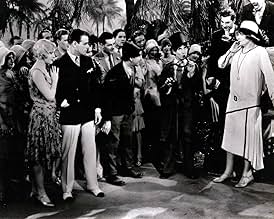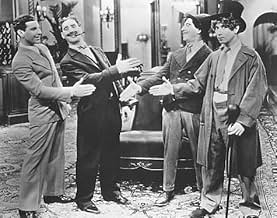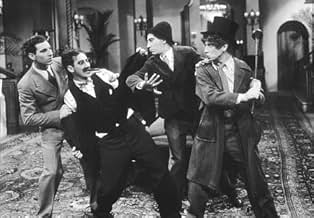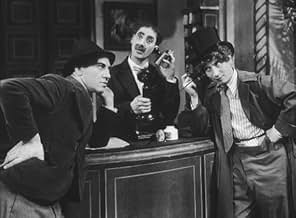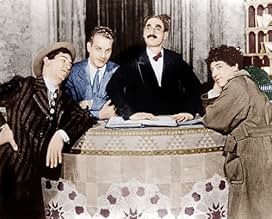NOTE IMDb
6,8/10
8,6 k
MA NOTE
Groucho est le gérant d'un hôtel qui connaît des difficultés financières. En raison d'une faillite imminente, l'hôtel est vendu aux enchères, mais les choses se compliquent avec l'arrivée de... Tout lireGroucho est le gérant d'un hôtel qui connaît des difficultés financières. En raison d'une faillite imminente, l'hôtel est vendu aux enchères, mais les choses se compliquent avec l'arrivée de Chico et Harpo, et le vol d'un collier précieux.Groucho est le gérant d'un hôtel qui connaît des difficultés financières. En raison d'une faillite imminente, l'hôtel est vendu aux enchères, mais les choses se compliquent avec l'arrivée de Chico et Harpo, et le vol d'un collier précieux.
- Réalisation
- Scénario
- Casting principal
- Récompenses
- 2 nominations au total
Groucho Marx
- Hammer
- (as Marx Brothers)
Harpo Marx
- Harpo
- (as Marx brothers)
Chico Marx
- Chico
- (as Marx Brothers)
Zeppo Marx
- Jamison
- (as Marx Brothers)
Gamby-Hale Ballet Girls
- Dancers
- (as Gamby-Hale Girls)
Dolores Hope
- Dancer
- (non crédité)
Sylvan Lee
- Bell Captain
- (non crédité)
Barton MacLane
- Lifeguard
- (non crédité)
Avis à la une
I've been told it's the first musical comedy to have been made. God only knows what that makes The Jazz Singer then - heavyweight drama, I suppose.
The first problem you're going to have if you want to see it is actually seeing it. The film has been very hard to find on DVD. A copy is now available on the recently released version of the UK box set of their early films but as yet has not been released on it's own. I believe this situation varies elsewhere in the world.
The second problem you'll have if you want to see it is actually seeing it. Beware cheap copies from distant lands. The film has fallen into disrepair due to neglect. This has meant that some copies of the film are almost totally unwatchable. I remember being given a copy of the film that was released in Australia where parts of the picture had been almost completely washed away while the soundtrack could barely be heard of the crackles of the tape.
Still, if you do find a good copy it is well worth watching. The filming is very static and the acting wooden in comparison to their later movies. However, given that this was their first release and based upon their second successful Broadway run, I think that can be forgiven.
The characters are already clearly drawn out and some of the sketches are as funny as anything they did later on in their career. The 'Why a Duck' sketch can rate along side the 'tootsie-frootsie' sketch as one of the best sketches between Groucho and Chico.
The music is forgettable, the plot wafer thin, but you'll laugh out loud more than the majority of the films you'll ever see.
The first problem you're going to have if you want to see it is actually seeing it. The film has been very hard to find on DVD. A copy is now available on the recently released version of the UK box set of their early films but as yet has not been released on it's own. I believe this situation varies elsewhere in the world.
The second problem you'll have if you want to see it is actually seeing it. Beware cheap copies from distant lands. The film has fallen into disrepair due to neglect. This has meant that some copies of the film are almost totally unwatchable. I remember being given a copy of the film that was released in Australia where parts of the picture had been almost completely washed away while the soundtrack could barely be heard of the crackles of the tape.
Still, if you do find a good copy it is well worth watching. The filming is very static and the acting wooden in comparison to their later movies. However, given that this was their first release and based upon their second successful Broadway run, I think that can be forgiven.
The characters are already clearly drawn out and some of the sketches are as funny as anything they did later on in their career. The 'Why a Duck' sketch can rate along side the 'tootsie-frootsie' sketch as one of the best sketches between Groucho and Chico.
The music is forgettable, the plot wafer thin, but you'll laugh out loud more than the majority of the films you'll ever see.
A lot of people don't find The Cocoanuts to be as entertaining as some of the later Marx Brothers films. Maybe not, but it definitely comes close. Personally, I thought this was the Marx Brothers' fifth best film. It's not that it's bad, because it great, but it's just not as good as some of the others, that's all.
As several other people have said, it really doesn't stand up technically as well as most of the others, but that has nothing to do with the quality of the script, which is just great. I truly believe that if I had seen this in 1929, I would have been as hooked on the Marxes as I am now.
There are many great bits in this movie, including the first scene between Groucho and Chico, the Auction, the connected bedroom thing, and the first time we ever see Groucho do his thing with Margaret Dumont. But the only scene in this movie to make my personal Ten Best Marx Scenes is the Why-A-Duck routine. Genius, it's just pure genius. That's my only word for it.
Harpo really doesn't have a lot of good stuff in this movie. He's great in what he doesn't have, but he really shines in Monkey Business and Duck Soup. Those are his two best performances, if you ask me. If you are looking for classic Harpo, I'd suggest watching either of those. Also, Zeppo, obviously, has nothing to do. But then, what did you expect?
This movie has a few actually rather unfunny spots in it, but you can blame that on the fact that this is the brothers' first movie, and they are still getting used to the camera. But it has a lot more comedy than non-comedy and is still a whole lot better than most of the "comedies" that are coming out nowadays.
This may sound a little strange, but if you have never seen a Marx Brothers movie, I suggest watching this one first. It's a lot more enjoyable if you aren't expecting it to be equal to Duck Soup or Animal Crackers. Because it's not. But, as I can not stress enough, it is still worth checkout, and better than than anything they did post-A Night at the Opera.
Well, it's the Marx Brothers best movie of the 20's, anyway.
8/10
As several other people have said, it really doesn't stand up technically as well as most of the others, but that has nothing to do with the quality of the script, which is just great. I truly believe that if I had seen this in 1929, I would have been as hooked on the Marxes as I am now.
There are many great bits in this movie, including the first scene between Groucho and Chico, the Auction, the connected bedroom thing, and the first time we ever see Groucho do his thing with Margaret Dumont. But the only scene in this movie to make my personal Ten Best Marx Scenes is the Why-A-Duck routine. Genius, it's just pure genius. That's my only word for it.
Harpo really doesn't have a lot of good stuff in this movie. He's great in what he doesn't have, but he really shines in Monkey Business and Duck Soup. Those are his two best performances, if you ask me. If you are looking for classic Harpo, I'd suggest watching either of those. Also, Zeppo, obviously, has nothing to do. But then, what did you expect?
This movie has a few actually rather unfunny spots in it, but you can blame that on the fact that this is the brothers' first movie, and they are still getting used to the camera. But it has a lot more comedy than non-comedy and is still a whole lot better than most of the "comedies" that are coming out nowadays.
This may sound a little strange, but if you have never seen a Marx Brothers movie, I suggest watching this one first. It's a lot more enjoyable if you aren't expecting it to be equal to Duck Soup or Animal Crackers. Because it's not. But, as I can not stress enough, it is still worth checkout, and better than than anything they did post-A Night at the Opera.
Well, it's the Marx Brothers best movie of the 20's, anyway.
8/10
Contrary to popular belief, Cocoanuts was not the first Marx Brothers movie. That honor belongs to Humorisk, a silent film which no longer exists. It was greeted with such hostility that one master reel was burned, and the other deteriorated in a producer's closet. It is difficult to imagine Chico and Groucho in a silent film, and while one might envision Harpo as the ultimate silent comedian, his whistling and horn-honking formed an essential part of his act.
By 1929, however, sound was here to stay, and many silent comics suddenly found themselves out of work. In fact, the only two comedians to successfully make the transition from silent to sound were Laurel and Hardy (Chaplin didn't make his first sound movie until 1940, and was never comfortable with sound). Comedy teams like Stan and Ollie and the Marx Brothers needed dialog; even Harpo communicated with his brothers using broad gestures and the aforementioned honks and whistles.
The biggest story of 1929 (besides the stock market crash) was the Florida land boom. Mr. Hammer (Groucho) is the manager of a struggling hotel, trying to lure customers so that he can sell them Florida lots. Of course, Astoria, Long Island, where this movie was filmed, is not exactly the Sunshine State, and the opening tribute to "sunny Florida" shows us some sand poured on a sound stage to simulate a beach and a painted backdrop of palm trees and coconut. Groucho pursues the rich Mrs. Potter (Margaret Dumont), whose daughter Polly (Mary Eaton) is in love with Bob Adams (Oscar Shaw). Also interested in Polly (or rather, her mother's money) is Harvey Yates (Cyril Ring). Together with his parter Penelope (Kay Francis), they decide to steal Mrs. Potter's expensive necklace and blame it on Bob, easing the way for Yates to marry Polly.
The highlight of the film is the famous "Why a duck?" routine. It's Chico versus the English language, and guess who wins? When Groucho tells Chico that there's going to be an auction, he replies: "I come from Italy on the Atlantic Auction." When Groucho talks about levees, Chico thinks that's the Jewish neighborhood. When he asks him what a radius is, Chico responds that it's WJZ, at that time a popular New York radio station. And when it comes to the word "viaduct" he is totally lost.
Groucho: "Here's a little peninsula and here is a viaduct leading over to the mainland."
Chico: "OK, why a duck? Waya no chicken?" Having been told by Groucho to keep the bidding high during the auction, Chico, in a very funny scene, takes over the whole show, refusing to let anyone else in on the action.
As far as the music is concerned, it is difficult to imagine Irving Berlin writing such drivel as "When My Dreams Come True" and "Monkey Doodle-Do." The former is sung in a duet between Mary Eaton and Oscar Shaw (whom Groucho described as "strictly no-talent"). Indeed it's hard to determine which is worse-Shaw's acting or his singing.
There was a song written for "Cocoanuts," however, that was rejected because it made the show too long. It became one of Berlin's greatest hits. The song was "Always."
The print quality varies from good to fair. It appears that Universal spliced together scenes from several different prints to make one entire movie.
By 1929, however, sound was here to stay, and many silent comics suddenly found themselves out of work. In fact, the only two comedians to successfully make the transition from silent to sound were Laurel and Hardy (Chaplin didn't make his first sound movie until 1940, and was never comfortable with sound). Comedy teams like Stan and Ollie and the Marx Brothers needed dialog; even Harpo communicated with his brothers using broad gestures and the aforementioned honks and whistles.
The biggest story of 1929 (besides the stock market crash) was the Florida land boom. Mr. Hammer (Groucho) is the manager of a struggling hotel, trying to lure customers so that he can sell them Florida lots. Of course, Astoria, Long Island, where this movie was filmed, is not exactly the Sunshine State, and the opening tribute to "sunny Florida" shows us some sand poured on a sound stage to simulate a beach and a painted backdrop of palm trees and coconut. Groucho pursues the rich Mrs. Potter (Margaret Dumont), whose daughter Polly (Mary Eaton) is in love with Bob Adams (Oscar Shaw). Also interested in Polly (or rather, her mother's money) is Harvey Yates (Cyril Ring). Together with his parter Penelope (Kay Francis), they decide to steal Mrs. Potter's expensive necklace and blame it on Bob, easing the way for Yates to marry Polly.
The highlight of the film is the famous "Why a duck?" routine. It's Chico versus the English language, and guess who wins? When Groucho tells Chico that there's going to be an auction, he replies: "I come from Italy on the Atlantic Auction." When Groucho talks about levees, Chico thinks that's the Jewish neighborhood. When he asks him what a radius is, Chico responds that it's WJZ, at that time a popular New York radio station. And when it comes to the word "viaduct" he is totally lost.
Groucho: "Here's a little peninsula and here is a viaduct leading over to the mainland."
Chico: "OK, why a duck? Waya no chicken?" Having been told by Groucho to keep the bidding high during the auction, Chico, in a very funny scene, takes over the whole show, refusing to let anyone else in on the action.
As far as the music is concerned, it is difficult to imagine Irving Berlin writing such drivel as "When My Dreams Come True" and "Monkey Doodle-Do." The former is sung in a duet between Mary Eaton and Oscar Shaw (whom Groucho described as "strictly no-talent"). Indeed it's hard to determine which is worse-Shaw's acting or his singing.
There was a song written for "Cocoanuts," however, that was rejected because it made the show too long. It became one of Berlin's greatest hits. The song was "Always."
The print quality varies from good to fair. It appears that Universal spliced together scenes from several different prints to make one entire movie.
A brilliant film debut by the Marx Brothers in this 1929 musical comedy (from Broadway) about land speculation in Florida, jewel thieves, and well the Marx Brothers. In their first film, all the familiar schtick and word play are already in place with Groucho, Chico, and Harpo all excellent.
As usual there is also a romantic young couple--Mary Eaton and Oscar Shaw--and bad guys--Kay Francis and Cyril Ring. Also making her film debut at age 40 is the wonderful and imperious Margaret Dumont. Basil Ruysdael plays the house detective. Zeppo Marx plays the desk clerk.
A blah ballad is sung to death, but The Monkey Doodle-Doo song is terrific and well sung and danced by Eaton (a Broadway star) and chorus. Oddly staged productions number with chorus in monkey suits and tourists milling about in the background. But Eaton is quite good, considering the early sound equipment. And she has great legs.
Francis is fun in her second film (she made five in 1929) but teamed with the unappealing Ring. Shaw is OK but seems too old to be playing the juvenile lead.
But while Dumont, Francis, and Eaton are fun, it's the 3 brothers who dominate the film. Several classic bits, including the viaduct gag, Chico's great piano solo, Harpo getting to steal a few scenes, and of course Groucho riding roughshod over everyone. What a treat! While Kay Francis went on to major stardom in the 30s, Mary Eaton made one disastrous film after this hit, Flo Ziegfeld's Glorifying the American Girl. That ended her starring career in Hollywood.
The more I watch the Marx Brothers the more I appreciate Chico, who was always my least favorite of the 3. Now I notice his perfect comic timing and I just love his piano solos.
As usual there is also a romantic young couple--Mary Eaton and Oscar Shaw--and bad guys--Kay Francis and Cyril Ring. Also making her film debut at age 40 is the wonderful and imperious Margaret Dumont. Basil Ruysdael plays the house detective. Zeppo Marx plays the desk clerk.
A blah ballad is sung to death, but The Monkey Doodle-Doo song is terrific and well sung and danced by Eaton (a Broadway star) and chorus. Oddly staged productions number with chorus in monkey suits and tourists milling about in the background. But Eaton is quite good, considering the early sound equipment. And she has great legs.
Francis is fun in her second film (she made five in 1929) but teamed with the unappealing Ring. Shaw is OK but seems too old to be playing the juvenile lead.
But while Dumont, Francis, and Eaton are fun, it's the 3 brothers who dominate the film. Several classic bits, including the viaduct gag, Chico's great piano solo, Harpo getting to steal a few scenes, and of course Groucho riding roughshod over everyone. What a treat! While Kay Francis went on to major stardom in the 30s, Mary Eaton made one disastrous film after this hit, Flo Ziegfeld's Glorifying the American Girl. That ended her starring career in Hollywood.
The more I watch the Marx Brothers the more I appreciate Chico, who was always my least favorite of the 3. Now I notice his perfect comic timing and I just love his piano solos.
"The Cocoanuts" is the very first film the Marx Brothers did and is essentially a filmed recording of their Broadway triumph. Talkies were still in their infancy, and the technical aspects of this flick prove it! The camera can barely keep up with the boys as they leap around. But don't let the staginess and crummy musical interludes and subplots distract you... this film has some of the great moments in Marx comedy. Chico is especially aggressive with his lines (he just annoys the hell out of Groucho, foiling his plan to rig an auction with his denseness) and Harpo (with his original red wig, which films dark brown) has never been better, destroying the hotel lobby by eating buttons off bellboy's uniforms and swilling ink. Groucho has some of his most potent insults. Zeppo, surprisingly, has even less to do here than in subsequent outings. This film is hilarious and head-and-shoulders above their later MGM films like "Go West" and "At the Circus." Funny, funny, funny!
Le saviez-vous
- AnecdotesDuring the "Why a duck?" sequence, it seems that Groucho Marx almost calls Chico Marx "Ravelli", which is Chico's character in Animal Crackers. Since they were shooting The Cocoanuts in the morning and acting in Animal Crackers at night, this mix up is understandable.
- GaffesIn the opening scene, Hammer sends Jamison to meet a 4:15 train. When Jamison gets back, he refers to it as a 4:30 train.
- Crédits fousThe opening credits are run against a background of negative film of the "Monkey-Doodle-Doo" number.
- Versions alternativesDeleted Scenes:
- When the bellboys are protesting against being unpaid, Zeppo tells them that Groucho has yet to arise at four in the afternoon. His comforting postscript, that Groucho always gets up on Wednesday, precedes his arrival. This scene was shot, but later cut after the preview, leaving Groucho descending down the stairs, still putting on his coat, allowing time to ward off his staff to catch a 4:15 train.
- Another item that was cut from the preview version of the film was a love ballad sung by Groucho to Margaret Dumont entitled "A Little Bungalow". Originally sung in the play by the romantic leads Polly Potter and Robert Adams, the song slowed up the picture.
- ConnexionsFeatured in 46th Annual Academy Awards (1974)
- Bandes originalesFLORIDA BY THE SEA
(1925) (uncredited)
Written by Irving Berlin
Sung off-screen by chorus
Danced by Gamby-Hale Ballet Girls and Allan K. Foster Girls
Meilleurs choix
Connectez-vous pour évaluer et suivre la liste de favoris afin de recevoir des recommandations personnalisées
- How long is The Cocoanuts?Alimenté par Alexa
Détails
- Date de sortie
- Pays d’origine
- Langue
- Aussi connu sous le nom de
- Los cocos
- Lieux de tournage
- Kaufman Astoria Studios - 3412 36th Street, Astoria, Queens, New York City, New York, États-Unis(Paramount Astoria Studios site)
- Société de production
- Voir plus de crédits d'entreprise sur IMDbPro
Box-office
- Budget
- 500 000 $US (estimé)
- Montant brut mondial
- 57 $US
- Durée
- 1h 36min(96 min)
- Couleur
Contribuer à cette page
Suggérer une modification ou ajouter du contenu manquant


